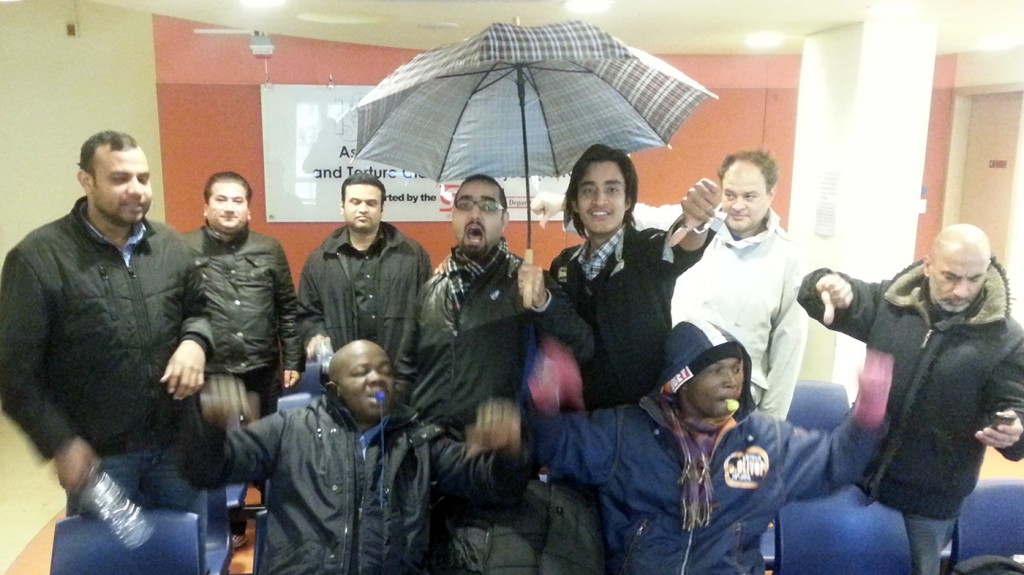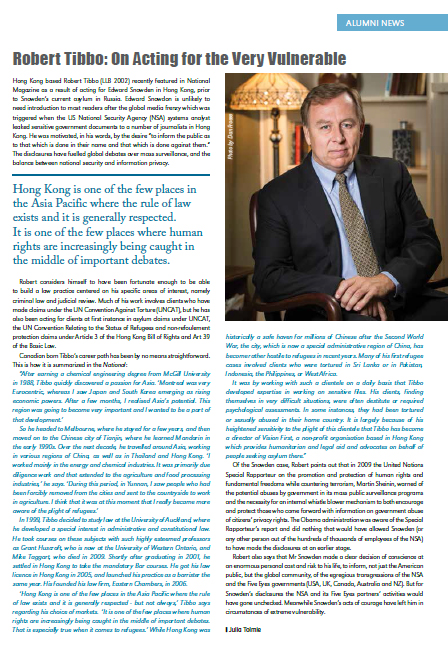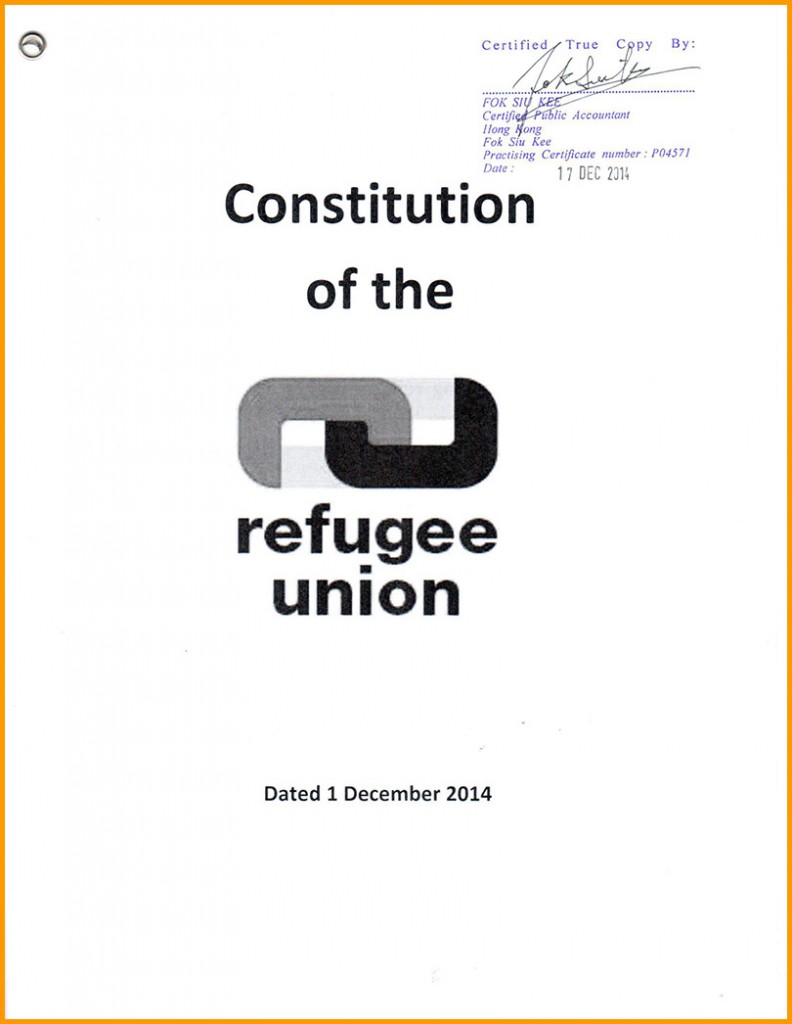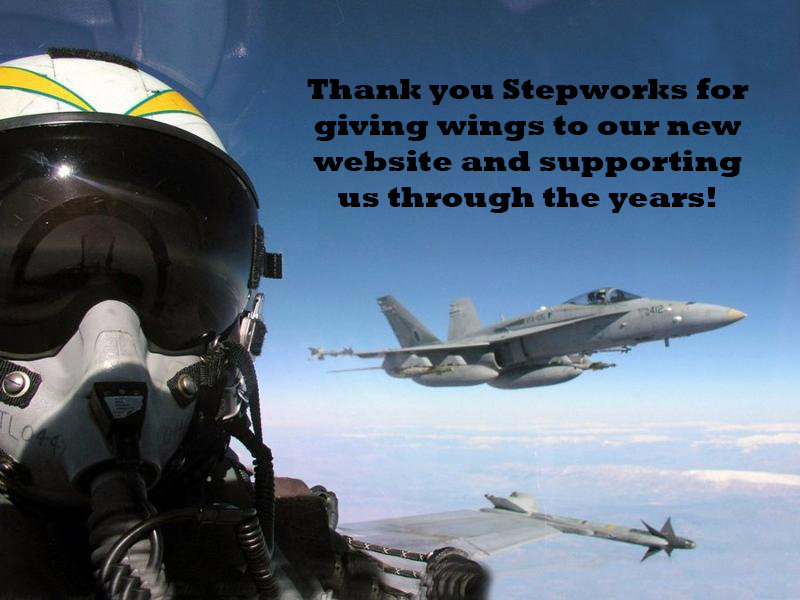Who safeguards the inherent rights of refugee children?
Dec 29th, 2014 | Advocacy, VF Opinion | Comment
The op-ed by Grenville Cross SC recently published in the SCMP, “Hong Kong’s children need better protection of their rights” is worthy of our attention and comment. Vision First applauds the advocate for attempting to shed light on what constitute the best interest of children and how the government is on the right path to deliver better policies and reforms, albeit slowly.
However, Grenville Cross SC may not be aware of the appalling infringement of the rights of refugee children. Vision First therefore invite him to visit refugee families that are conspicuously sidestepped by the same administration he states is working towards eradicating poverty and enhancing the livelihood of the poor. He would then witness first-hand how children with refugee parentage are forced to endure the shameful conditions the government claims to be tackling.
The pattern is as disgraceful as it is widespread and Vision First repeats it emphatically: refugee parents are compelled to work illegally to pay living and education costs inexplicably only covered by the government in part; mothers worry their children will go hungry when meager food rations are consumed before the next three monthly collection; children dejectedly skip school when travelling allowances are exhausted; students are discriminate against because they cannot afford to buy school books, lunch-boxes, uniforms, or join extra-curriculum activities, or bring cake to birthday parties.
Nobody is under any illusion about the challenges and cost of raising children in our expensive city. Basic but necessary expenses disregarded by the government can only be met by refugee parents if they either humble themselves by begging, or stoically risk incarceration by engage in illegal work, both activities presenting predictable and unenviable drawbacks.
While charity is neither sufficient nor dependable in the long term (NGO workers cherry-pick the fortunate), work is outlawed as a serious crime punishable by a mandatory custodial sentence (maximum 36 month jail and 50,000$ fine). Since parents are stigmatized as unwelcome vagrants denied legal and economic rights, refugee children are often condemned to live without one at home if a parent is jailed for earning money for food, clothes, transport or school.
All this happening in dreadful, unsanitary living conditions, frequently in slums, and under unending psychological distress. In fact, refugee children are condemned to suffer 40 percent below the poverty line, without any prospects of improving prospects as parents are legally prevented from earning a living. And this without taking into account the statelessness they are generally condemned to when parents are fearful of their consulate authorities.
Vision First raises alarming questions about the vulnerability of refugee children:
- Why are refugee children ignored despite falling well below what is provided to the poorest resident children?
- Why do authorities fail to address the huge criticism in UN reports, including this one by the Committee on the Rights of the Child?
- Will the Child Protection Institute promote the rights and wellbeing of refugee children, who are the veritable invisible and untouchable in our society?
- When will HK government safeguard the inherent rights of these children?
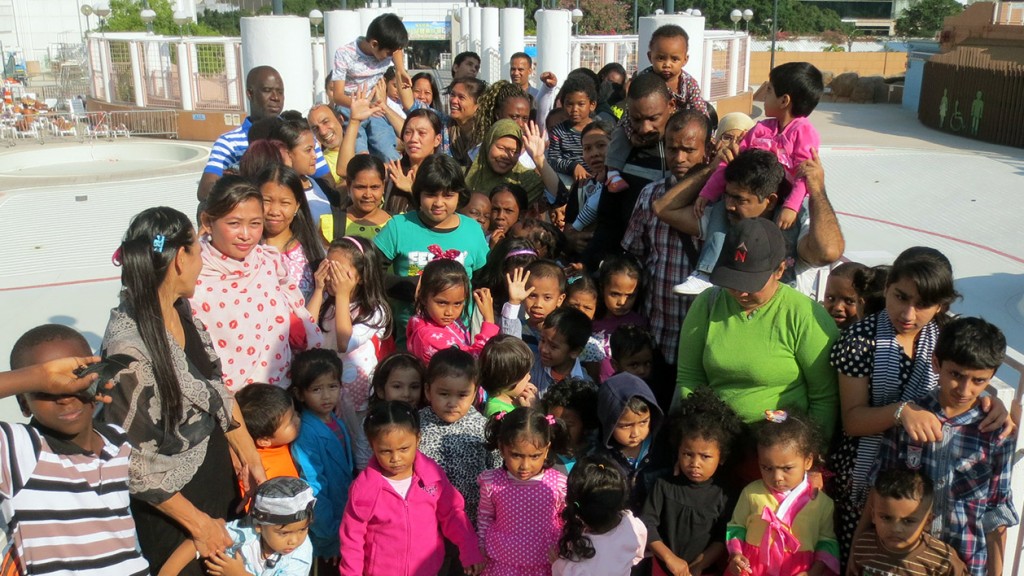
VF Report: The Slum in the Farmhouse closes down!
Dec 28th, 2014 | Advocacy, Housing, VF Report | Comment
Since 2010 Vision First visited regularly “The Slum in the Farmhouse”. Remember the purported landlady who boiled water on a fire for refugees to shower? On these visits we collected information and evidence from residents who at one point numbered 22 refugees, the overwhelming majority of whom were actively managed by ISS-HK through monthly “Agreements for provision of service” (including public rent paid with tax-dollars and home visits to approve allegedly unauthorized structures).
For two years Vision First steadfastly contended that it is wrong and immoral to subject refugees to degrading and dehumanizing living conditions. Such a contemptible practice is particularly scandalous since refugees are prohibited from working and thus cannot earn their way to better accommodation.
Vision First is pleased to report that finally something is changing!
ISS-HK seems to be reacting to the exposure of refugee slums. The Social Welfare Department contractor no longer approves certain slums as residence for refugees and advises tenants to look elsewhere for proper accommodation. Why? Is it an acknowledgement that something was improper?
While we can only speculate on ISS-HK’s decisions, we ponder why certain slums are going out of business. Do some slum lords feel pangs of guilt for exploiting refugees? Very unlikely. Is surgical enforcement action being taken by government departments to purge illegal structures only in a limited number of slums? Possibly. If information on these dreadful compounds is not readily available to these departments Vision First will ensure it will be.
Facts lead us to believe that cracks are appearing in the way refugees are segregated into slums. SWD helps us to form this opinion. In November 2014, the SWD announced a new tender dividing Hong Kong into three regions, introducing competition and launching food coupons to counter widespread irregularities in the food distribution channel.
Crucially, SWD replied to Vision First‘s questions on the tender by stressing that refugees need to be housed in legal structures. The closure of some slums (curiously not the worst structures) might indicate that Hong Kong government is no longer willing to tolerate irregularities in refugee welfare management that raised public queries and complaints.
A few months ago, refugees who lived in Slum No. 12, some for up to five years, started to report that their case workers at ISS-HK were unwilling to extend tenancy agreements in that compound. Tenants curiously admitted that “Mammy did not have the right documents” (as the slum lady was popularly called), confirming Vision First’s suspicions of irregularities.
Subsequently, expiring tenancy agreements at the Slum in the Farmhouse were not renewed and homeless refugees were not permitted to settle there. The number of ISS-HK clients in the compound steadily dwindled from almost twenty at the beginning of the year to just three in November 2014, evidence that the tide had turned.
This policy shift raises troubling questions. What will ISS-HK do with the refugees whose rooms are now been deemed improper? Does ISS-HK expect that these clients will relocated to other ‘acceptable’ slums? Isn’t this just shifting and confining vulnerable people from one dump to another?
When the last three leases will expire, the Slum in the Farmhouse will cease to exist and that is certainly a reason to celebrate. However, it seems that the plug was pulled because of reasons other than dangerous living conditions which might signify that SWD continues to support refugee slums.
VF’s original report on the Slum in the Farmhouse (4 Sep 2013)
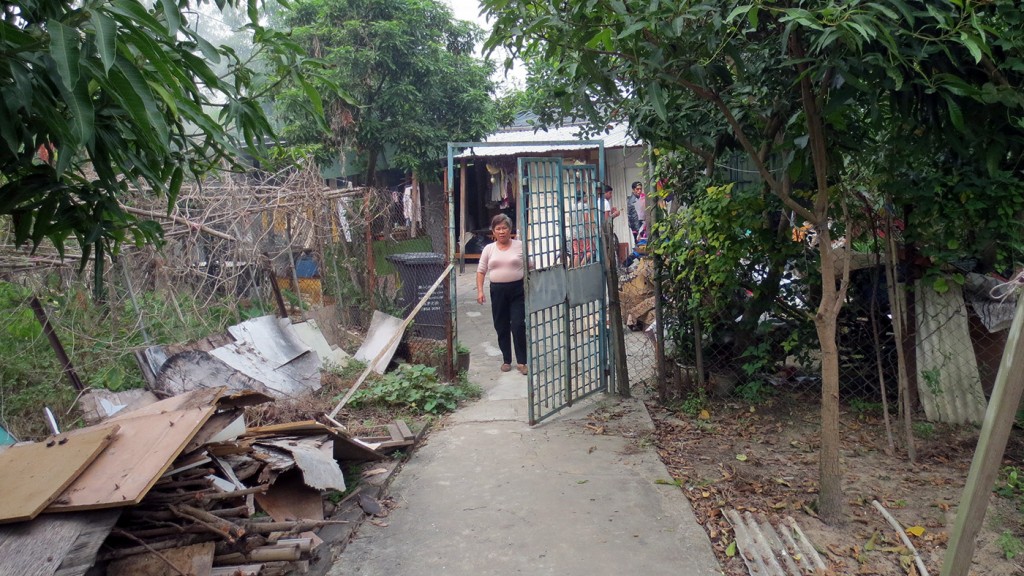
Presidential Elections in Togo: here we go again
Dec 24th, 2014 | Refugee Community | Comment
As one of dozens of Togolese refugees who took refuge in Hong Kong, I query why the Immigration Department never accepted one of my compatriots despite: a) 50 years of repressive dictatorship in Togo, and b) many of our colleagues having been readily accepted as refugees in European countries. Here is a brief history of the political situation in my country.
For 50 years power has been controlled by the Gnassingbé Clan that took hostage the people of Togo without justice. In fifty years nothing changed, neither in fact, nor in the way was power held at all cost by this father-son dynasty.
It is reported that no election in Togo has met the basic minimum requirements of modern politics: transparency, honesty and fairness in relation to the outcome of the elections. In Togo the elections always end up the same way: they deliver a predictable share of plunder, brutality and funerals of voters who are reduced to political collateral victims.
In this context the government party rallies voters who are hungry and have no choice. They give them 5Kg of rice to buy their vote. They do this every 5 years so effectively each vote is worth 1Kg of rice a year. What a joke. The international community looks the other way and calls Togo ‘democratic’.
The Gnassingbé Clan seized power in 1963 when General Gnassingbé Eyadéma, the Father, killed the previous president. He stayed behind the curtains until he started his official rule in 1967. Since 1963 the Father has killed without mercy every activists that he could identify and arrest, including my friends.
Political opposition started in 1991, with the “COD” coalition, after the Father signed a decree to allow a multi-party system with no real power. In 1992 the government and COD arranged the National Conference for Peace to acknowledge and forgive the atrocities of the past. Alas the peace agreement ended up with everyone running home scared, then more fighting and more bloodshed.
During the conference the opposition wanted to dissolve the Father’s political party, the Rally of the Togolese People (RPT), but this proved impossible. That was the end of the conference. A national strike followed and for 13 months nobody went to school or went to work, but they could not break the Gnassingbé Clan’s stranglehold on power.
From 1967 till 1993, the Father Gnassingbé was the only election candidate, like in North Korea. Under International pressure, in 1993 the Father allowed multi-party candidates, but he cheated that election every 5 years until now. The government appoints a group of people (CENI) who supervise the election, but they are the President’s People and falsify paperwork and computer records.
When each election finishes they say that the Father is the winner, or they will disappear and be killed. The Chief Judge, who is appointed by the President, then formally proclaims the winner. And this has been going on since 1993 with deadly persecution of all activists and genuine opposition leaders.
Only Death could end the Father’s absolute power. But when he died in 2005, he was succeeded by his son Faure Gnassingbé, after an operation to exile the president of the Assembly in Benin, as he was constitutionally next in line. This cleared the way for the Son who, with the protection of the army, rapidly took control of Togo.
Again the people protested. In due course the Son made a fake concession and put the assistant of the president of the assembly as President and scheduled fresh elections. But the RPT proposed the Son Gnassingbé as candidate and predictably he won the election. The Son cheated in the elections of 2005 and 2010 and will repeat this year.
According to law he could only be elected twice, but the Son changed the Constitution to say that the President could rule “forever”, so he plans to rule Togo as a lifetime dictator. The Son craves power like the Father and he won’t give up. My people suffer and hundreds of political activists escape abroad, including to Hong Kong where I sought refuge over 10 years ago.
For the good and honourable people in Hong Kong Government who believe in the supremacy of human rights, I have these questions:
- How many political activists will be found dead in the bush, will be swallowed by the lakes and will disappear in the ocean before justice comes to Togo?
- How many activists will flee Togo in exile and come to Hong Kong?
- When will the first Togolese refugee be accepted in Hong Kong?
- You people who fight for justice where are you?
(Name, Immigration number and contact details provided)
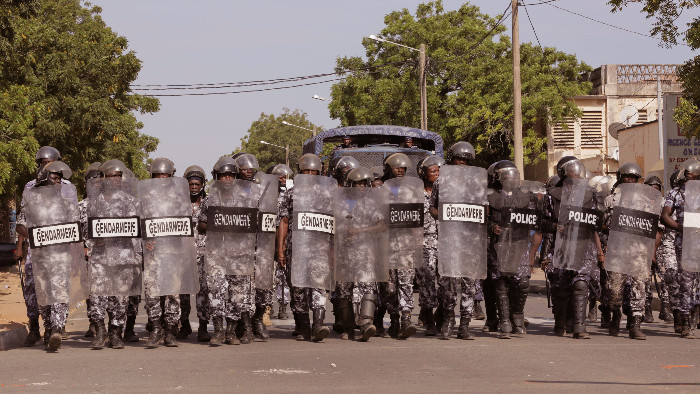
Hunger strike shows the face of death
Dec 22nd, 2014 | Detention, Immigration, Personal Experiences, Refugee Community | Comment
It was almost 15 years ago but I remember the day like it was yesterday. I came to Hong Kong to save my life. I had to find a safe place after fleeing Pakistan in the summer of 2001. After many years in 2010, my torture claim was rejected and I was charged with “remaining in Hong Kong unlawfully”. I was sent to prison for eight months for what I consider seeking asylum here.
When I was arrested, I was in shock … suddenly everything changed and I felt like a criminal. Immigration does not issue “asylum visas” so how are refugees expected to remain legally in Hong Kong while they wait for decision on their cases? Some refugees waited years for UNHCR to reject their case and didn’t surrender to Immigration. After rejection they were also prosecuted and jailed. Is it fair?
In June 2011 I was released from Pik Up Prison and transferred to Castle Peak Bay Immigration Centre (“CIC”) for deportation procedures. The government wanted to send me back to Pakistan where I told them my life was in serious danger. But nobody believed me. After I went inside CIC the office-in-charge took me to a room and shouted at me, “You must go back to your country!”
I said I would not go back, because my life is still not safe in Pakistan. After some questions, I had to sign some documents, then they sent me to the hall where a lot of people were waiting. Every day the officers force and force me to go back to my homeland. They didn’t’ listen. They didn’t believe. They didn’t understand. But why I choose more and more detention?
In this world, I think, most important and precious for every human being, after the air we breathe, is human rights and freedom. I always refused to be deported because I will face danger in Pakistan. Even if my arms and legs are bound in Hong Kong, I must prefer to stay here than return to be tortured to death.
When my trouble started we were 5 guys pressured by officers every day to leave Hong Kong. There were 2 Pakistani and 3 from India, but one India guy they sent back after a few weeks. And here I tell you a story that perhaps you will find hard to believe, but I have proof that I can show you. It was also reported in the South China Morning Post one day in September 2011.
The Immigration officers always force me to go back, but how I go back when still my problem is same since 2001? After many weeks the Immigration still refuse to give me bail out. I stopped eating and I was getting every day more and more sick. My hands and arms were shacking. They were not in my control. My arms were like rubber, they move and not stop. Then I was given a bed in prison hospital.
But Immigration still forced me to go back when I am sick. I was very tense. I was very scared. I didn’t know how many days or weeks I stopped eating. One night I went to toilet around 2am and I fell down. I could not stand up because my body was too weak already. My mind stopped working. Some friends helped to bring me out of the toilet. The officer-in-charge was shocked when he saw my condition.
The prison doctor called the emergency ambulance and they brought me out to Tuen Mun Hospital. I was in shock. I felt I was dreaming. The doctor injected me some medicine. After the check-up I was returned to prison hospital. I don’t know the exact date or month, but this happened during my detention at CIC, from 4 June 2011 to 20 June 2012. And they kept pressuring me to go back!
Later I learn the word “Hunger Strike”. For me it was just not eating as I wanted to die so the officers stop forcing me to go back my country. During the hunger strike three times my situation was very bad and I think I was dying. My body had no power. I don’t know how much weight I lost but my arms were skin and bones. My mind did not work and everything was like dreaming. Even my hands were not in control. Why I wanted to die and not live? I better loved detention and didn’t want to be deported. In prison I had life and breath and water. In my country I have fear and death. Why should I go back?
From childhood I read in books that for human life two things are most important: oxygen and water. So I had these two important things in my detention. More than 50 days I stayed inside the prison hospital. Many times they took me to Tuen Mun hospital. As a Muslim I believe in God and maybe I still have life because God is always with me.
I made 78 days hunger strike for my safety and for my freedom. Refugees who were inside with me are still in Hong Kong and they saw my arms become like sticks and my hands curl in like claws I could not move. I think the Merciful God gave me a new life and on 20 June 2012 Immigration give me bail out. Now even I forget my real birthday, because Immigration give me a new birthday.
So here in my mind I have a lot of questions. Was my long detention in CIC lawful? Were the law and the monthly notifications for further detention legal? The further detention made me hunger strike for 78 days. Even I was not a normal person, I was a prisoner. Even I had finished my sentenced in Pik Uk Prison. Even I was patient, but I could do nothing to make Immigration believe my case is real.
I stopped eating because I had no choice. If I go back I die suffering, but in prison I die peacefully. I stopped eating to try for freedom, to save my life. The law kept me in prison, but the hunger strike released me. The law is a very friendly thing for humanity. The country makes the law for a good and happy society. So we always try to do good and within the law. But every law is not always a right law.
I say respectfully that in my detention the law showed me the real face of death. I came very close to the world of death. Kindly believe me because every not eating day and hard suffering night, I saw the Main Gate of the Death World. But the good law cannot make me safe. The law make me dead. And luckily or unluckily I am writing to you about my detention time. And please I don’t want to be hurt more because of what I write now.
As human beings we must follow, accept and respect the law, but kindly I request that please you make the law with unity and humanity. And I hope that all the asylum seekers in Hong Kong and inside CIC detention will always follow the law. Even if we can make hunger strike for freedom, but we must do it peacefully and don’t break the law, because the law is the law.
(Name, Immigration number and contact provided)
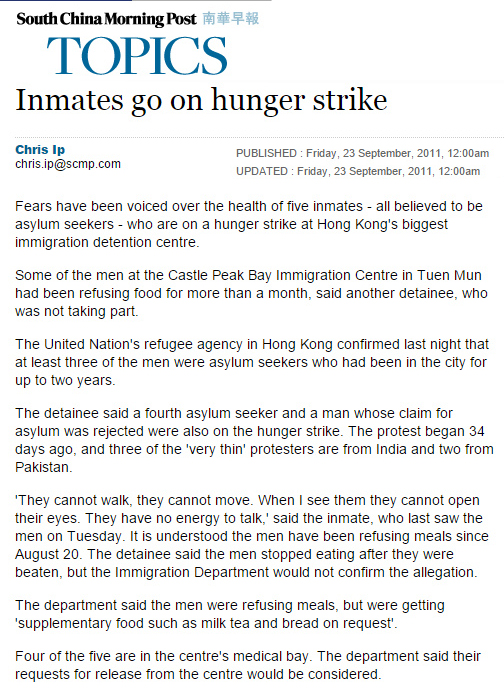
VF commend refugees for sharing stories with world
Dec 20th, 2014 | Advocacy, Crime, VF Opinion | Comment
Outspoken refugees are on a writing spree. Many of Vision First’s recent blogs featured our members sharing experiences of deprivation and destitution in Hong Kong, the latter remarkably a condition that the HK government supposedly aims to prevent by providing ‘in-kind’ humanitarian assistance.
The latest of these blogs, Rashid’s testimony of suffering at the hands of ‘the law system force refugees to do crime’, shines a spotlight on a problem that few ever raise despite it being well known.
Several questions spring to mind. Is the government hiding behind a humanitarianism smokescreen to undermine refugees’ civil rights and effectively force deprivation upon them? Is there a covert goal to raise their visibility in the criminal justice system? Do welfare strategies cunningly reinforce propaganda depicting refugees as undesirable illegal economic migrants and criminal abusers?
Rashid’s story raises a number of problems that we believe ought to be urgently addressed by the authorities.
First, upon release from detention ‘humanitarian’ assistance isn’t available for several months, which increases the vulnerability of newly arrived refugees to economic abuse and exploitation. “A middle-class dog is treated better”, Rashid astutely observes. For weeks he slept rough in a public park, deprived of basic accommodation he could not afford on his own after agreeing with Immigration he would not work.
Second, talented refugees are turned into beggars and ‘terrorist-looking’ individuals, a dehumanizing process that arguably raises their categorization into a homogeneous group enclosed by clearly defined boundaries that set them as extraneous bodies in a wealthy global city where rightful residents are expected to be self-reliant.
Third, excluded from society, refugees are mentally tortures, deprofessionalized and deprived of their liberty. They are unlawfully detained in a “walking prison”, Rashid plaintively laments. Government control capacity has expanded in late modernity to a point that it need not lock people up anymore. Instead, states may exclude undesirable behaviour by creating labels that immediately cast bearers as outcasts, forcing their marginalization and surveillance.
Fourth, Rashid’s story is exemplar in that he perceptively understands the causation of the resultant problems. “Is the law fair?” he ponders distrustfully. While he certainly wants to believe so, he mournfully notices that it is indeed the law and its implementation that force refugees to find their way out of an untenable situation by seeking personal survival through legal or illegal ways.
Shackled by the twin chains of inadequate welfare and work ban, refugees speak of an ugly reality nobody dares to cast in the spotlight. Such an inconsistency cannot be ingenuously unplanned. Meanwhile an entire generation of people is lost to crime, crushed by the wheel of a repressive justice system. Why is this happening?
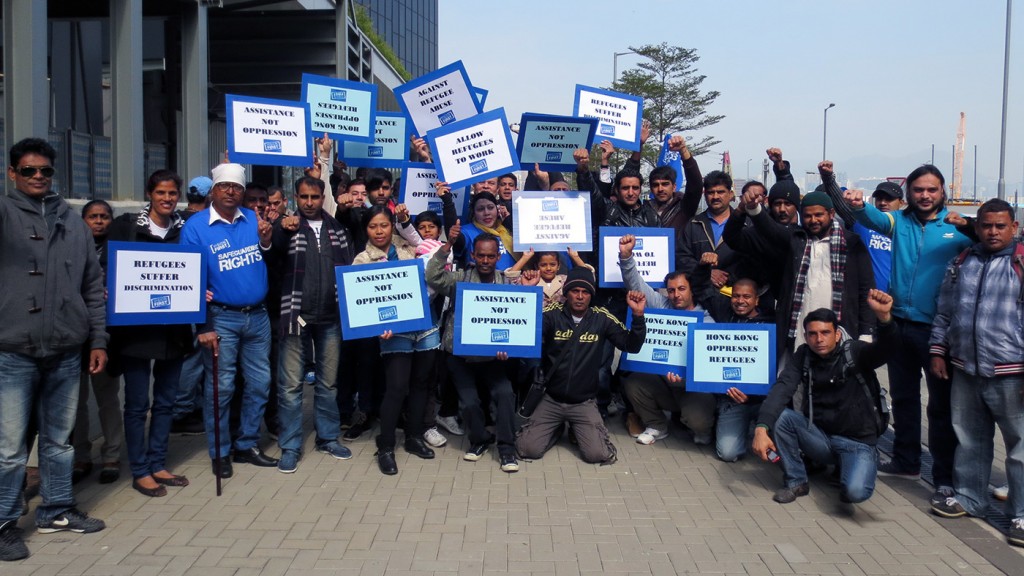
“The law system force refugee to do crime”
Dec 19th, 2014 | Personal Experiences, Refugee Community | Comment
My name is Rashid and I am Pakistani refugee in Hong Kong since early 2009. After five years of waiting Immigration still hasn’t started interviewing me, what they are waiting for I don’t know. I want to share with you the real and true feeling of what happened to me in Hong Kong.
In my country I ran my own medicine company and worked with surgeons in hospital operating theaters. After my problems started and my government failed to protect me, I had no choice but to flee Pakistan and I took refuge in Hong Kong where I have been waiting for my future.
I was held for 36 hours in police custody, then sent to Immigration detention at CIC Tuen Mun, from where I was released a week later with recognizance paper. The day I was bailed out they took my signature on a document and warned me that asylum seekers cannot do any kind of work or whatever job, even part-time for two or three hours. I signed in agreement.
After release I still had some money in my pocket which I spent to take a room in Yuen Long for 1000$ a month. Actually the room should not be called a room for humans. I think also a middle class dog in Hong Kong has a nicer place to sleep. But it is OK because dog luck and my luck are not same!
I bought some Halal food and ate. After one day rest in my room I learnt about the Social Welfare Department for refugee assistance and went there to register. They told me as soon as we call, you come, but even one and two months later they don’t call me. My money was finished in one week, but I could not do any work or job. I met some kind people who helped me for a while.
I had to borrow money which I could not repay. My friends’ help also finished, because two months passed already and I never received any call from SWD. I paid home rent, two months deposit, my food, water, clothes, my everything I needed. Shortly everything was finished and I felt very desperate how to live. Then I lost my room because I didn’t have money and slept in the Yuen Long Park like a dog.
I remember my business in Pakistan, my doctor friends and the good life I had before trouble take everything away from my life. I am not a beggar. I am not a poor man before, but refugee in Hong Kong must be poor and must be beggar because cannot work to earn little money.
Two months after I came to Hong Kong I experience being poor and beggar. I had Immigration Paper but I no had any protection, any assistance, any money even to buy water. For the first time I felt shame about sleeping in park and drinking water from the public toilet with my hands, because in toilet nobody put glass for beggar to drink. This is great shame as Muslim is not allowed to drink or eat anything relate to toilet! I always pray to the Mercy of God forgive me about those days.
My Dear Reader, you think how many refugees no have food for many days, no have water to drink, no have home for sleep, no washing powder for clothes, no brush to clean teeth! Some people say we have better life here than our country!
Even after three months already I was homeless, hungry, no shave, dirty clothes, if you see me you think “This is terrorist people!” But I am not bad person, I am an Immigration Recognizance holder for the last six years and still I am suffering in your city. I have pain in my heart. And this pain I will keep it forever in my heart even if I have to leave Hong Kong. Better I got to 15th floor and jump down and finish this pain in my heart because Hong Kong is very pitiless to refugees and make us like beggar.
Now I appeal to all human rights persons, to respectful people, to Refugee Union to save our future and life in Hong Kong. Stop the unlawful detention! Stop the mental torture of refugees! Stop refusing 100% of asylum case! Not one Pakistani asylum seeker win Torture Claim since 1992 when the refugee system start! How is possible that 100% Pakistani asylum case is not true?
The law system force refugees to do crime. How they can survive without assistance and without job? But when mentally tortured and physically abandoned, then bad comes our way and attract us every day. Because, by my Good and Merciful God, I tell you that good people become bad people under this situation. Hong Kong is a beautiful city on this planet, but it is dark and ugly for refugees.
My Dear Reader, please think of the young men and women who take refuge in your great city. You think, if nothing they have, no protection, no future, not enough assistance, no work. What will they do? Their many years waiting amount to zero. So what will they do? What is worse? To do suicide? To do crime? Or to do work? But even to do work is to do crime in this great city.
For almost three months I am homeless before the Refugee Union help me. I think of the law. I think of the system. I read the Immigration Ordinance Cap 115 that force me into a walking prison. I am homeless. I have no food, no money, no work. If I do job, the police catch me and put me three years in prison.
However, if I sell the illegal DRUGS it is so easy to make 1000$ tonight. If police catch me I can easy bail out from police station. But if refugee WORK, then even court bail can never get! My Good and Merciful God, how will I buy food today? How will I pay for shelter tonight?
If I sell DRUGS it is easy money. Even if go jail, in small drugs case only get 4 months sentence. But if refugee WORK, it is big crime in Hong Kong, the court will give you 18 months jail and then go back to Immigration detention for 3 months. Is this a fair and justice system?
So my Respectful Reader, which normal people choose 18 months jail better than 4 months jail? In the same situation like refugee, I think everybody will choose to do the crime with the more money and the less jail. Also the good person become bad person because the Chinese gangster come every day to knock on our door to make us be part of their gang system, or they threaten and beat us.
Refugee need legal work to protect their life in Hong Kong. The system doesn’t allow employment so the unlawful work can make people do crime. Even doctors say that people, especially young people, need exercise and activity. Work can be free work, like NGO work, but years and years of doing nothing can open the door to do crime.
Please tell me the law, the system does not want me to be suicide, or do illegal work, or sell and use drugs.
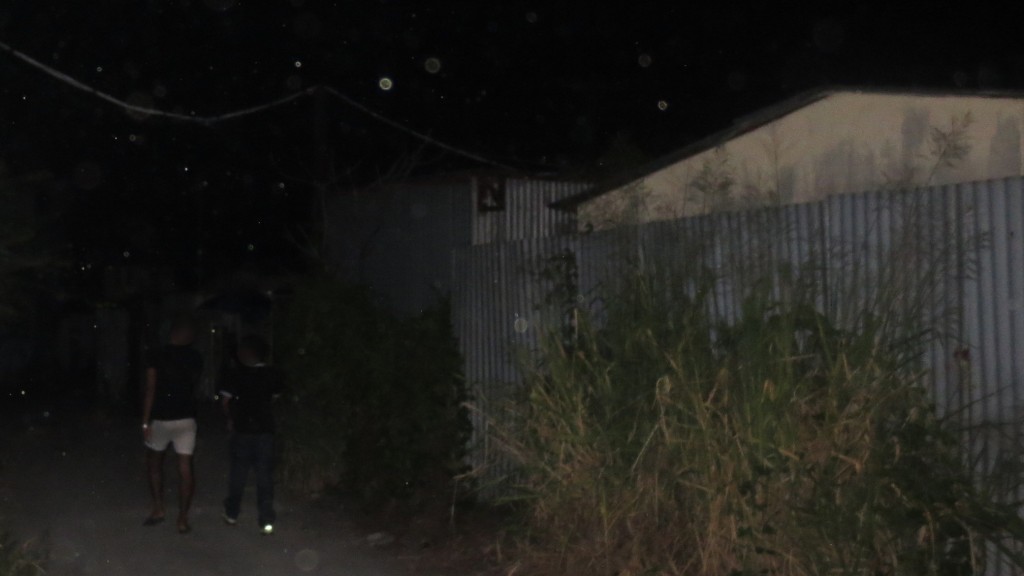
Refugee Union Endorses and Adopts the Constitution
Dec 18th, 2014 | Refugee Community | Comment
From the Refugee Union Facebook on 18 December 2014
On 15 December 2014 the Refugee Union members gathered for our weekly meeting at our office. From 2:00pm we started to share and exchange views and ideas. It’s an important forum where every member gets an opportunity to talk about issues affecting them. Members lament about their frustrations, inadequate rental assistance, unfair treatment from ISS and its food contractors who continue to cheat and ‘reduce’ our food allowance. Others have problems with accessing quality health care. It’s shocking to hear how doctors prescribe Panadol to sick refugee patients no matter the illness.
This Monday was a very special day for us members of the Refugee Union. This is the day that we unanimously endorsed and adopted the Refugee Union Constitution. We wrote history again. This means that in the history of Hong Kong we are the first refugee group to write and adopt a constitutional document. We do not have identity cards or any legal standing in this society. We have been issued with Recognizance papers that many people, even in government offices, don’t seems to know what’s they are. But we had the courage to come together and take a new path.
“This Constitution is the most progressive document I have ever seen”, said a refugee from West Africa. “It captures all our aspirations as group of people”, he continued. We do not have any legal status in this country, we are nobody. Hong Kong Immigration refuses to grant many of our members any protection and with that legal status. The majority of asylum cases are rejected on flimsy grounds and technicalities, therefore we are not able to secure employment for ourselves, open a bank account or even borrow a book from the library. We experience life at its most pitiless.
But in February 2014 refugees came together and opened an UMBRELLA in protest in the office of ISS before these humble instruments became a symbol of protest. And today we are united behind our first constitution. The struggle continues, brothers and sisters!
